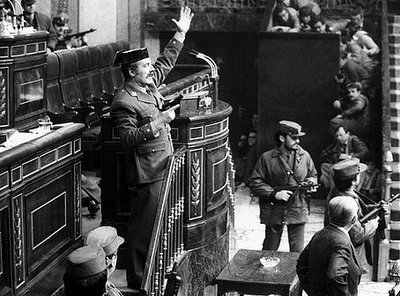
Spain's old guard defiant as general sacked
· Army 'hero' had warned of intervention in Catalonia · Row over autonomy hit ruling party's poll rating
Saturday January 14, 2006
At his Madrid home a few yards from Spain's defence ministry office, retired colonel José Conde bristled with pride as he declared that the country's army had found a new hero. "General Mena will be famous for the rest of his life," he said. "It is absolutely right to say that he has behaved heroically."
The only trouble with the new hero of Col Conde and of the 500 serving officers belonging to his conservative Association of Spanish Military Officers is that the hero in question - Lieutenant-General José Mena Aguado - was sacked yesterday.
The Socialist government of Prime Minister José Luis Rodríguez Zapatero formally declared Gen Mena's 40-year military career as a distinguished cavalry officer to have ended in disgrace.
Gen Mena's crime was to warn Spaniards of what he claimed was growing military anger over moves to give greater autonomy to the wealthy eastern region of Catalonia. He also reminded everyone that when Spain wrote a democratic constitution for itself in 1978 after nearly 40 years of military dictatorship under General Francisco Franco the army won the mission of "guaranteeing the territorial integrity of Spain".
His speech last week recalled for many the last time Spain's army got involved in politics - with a failed 1981 coup that saw a civil guard colonel, Antonio Tejero, storm parliament and take its deputies hostage.
The defence minister, José Bono, wrote Gen Mena off as a loose cannon among Spain's top brass. "It is an isolated case, and it has been dealt with," he said."A general has to be politically neutral."
But Gen Mena may not be alone. "He has, without doubt, expressed the opinion of the majority of officers," said Col Conde. "The situation is degrading. They want to pull Spain apart, limb from limb." Spanish newspapers have been inundated with letters from army officers - mainly retired ones who served under Franco - backing Gen Mena. One of the few who broke ranks was Colonel Fernando Abalo, a Nato staff officer in Brussels, who wrote to the conservative ABC newspaper calling Gen Mena "shameful and antediluvian".
Nobody in Spain, however, really believes that tanks are about to roll through the Catalan capital, Barcelona. "Nothing of that sort could happen now," said Col Conde.
In the 15th century palace which is home to the regional Catalan government the chief minister, Josep Bargalló, agreed. "This is 21st century Europe. We do not have military uprisings," said Mr Bargalló, a leader of the separatist Catalan Republican Left in coalition with the majority Socialists.
Mr Bargalló said that what concerned him was the criticism that has greeted the autonomy bill. Some criticisms, he claimed, were proof that Franco's ghost had not yet gone from Spain.
The bill, which has the backing of 90% of the Catalan parliament, calls for Catalonia to be formally recognised as a nation within Spain, collect its own taxes and to have its own supreme court.
The row has proved a problem for Mr Zapatero, whose party's poll ratings have slid behind those of the opposition conservative People's party. As a result he has backtracked on a pledge to approve whatever fresh autonomy demands the Catalan parliament made, as long as they were constitutional.
The anger emanating from Madrid has, however, had one result, according to Mr Bargalló. It has pushed more Catalans into the arms of the independence movement.
The effect is mutual, according to the Barcelona-based intellectual Félix de Azúa, who opposes the autonomy bill. "Spanish nationalism [of the Francoist kind] had been defeated and had disappeared. Now it is coming back."
Some see Gen Mena's move as a deliberate attempt to force the same kind of slowdown in devolving power to Spain's 17 semi-autonomous regions that followed the 1981 coup attempt.
"You don't actually have to bring the tanks out to make that happen," said Pere Aragonès, a separatist youth who demonstrated outside the military governor's office earlier this week.
BackstoryCatalonia became part of Spain in 1469, but kept its own government, the generalitat, until 1714. This was revived in the 1930s, then abolished by the dictator Francisco Franco. It reappeared with Spanish democracy in the 1970s. The 1978 constitution does not recognise Catalonia as a nation, though it ambiguously refers to "nationalities" within Spain. The 6.8 million Catalans account for 15% of Spaniards and produce 18% of GDP.
Guardian Unlimited © Guardian Newspapers Limited 2006








